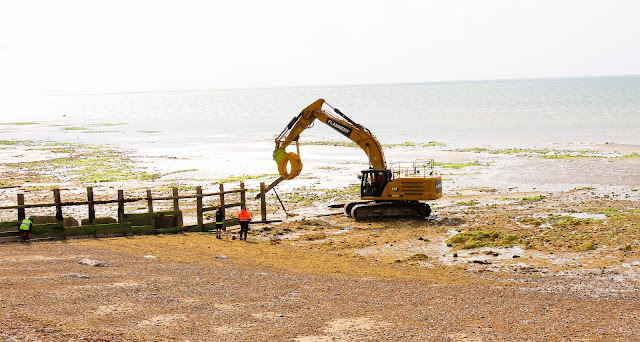Tuesday, 15th July: Heavy grey cloud and a strong wind, W/SW force 5-6 gusting to 7 through the morning, with the occasional heavy shower but also interspersed with sunny interludes.
Elmer Rocks: It was difficult trying to watch without being sheltered from the wind, so a sea-watch was the only practical option this morning. I managed to put in two hours, but overall it was a painfully slow, with Mediterranean Gulls dominating proceedings again. There were around 50 along the shore, with other small flocks also moving through in a mostly westward direction. Additionally, a flock of c.150 were just east of Poole Place on the rockpools area, with some departing as time went on....probably about 250 logged in total.
Offshore, there was a fair gathering of gulls feeding at some distance, with c.20 Gannets amongst them, of which about half were dark, juvenile birds. Several Sandwich Terns were also present, eventually drifting off westwards, whilst a single Curlew also headed west, but that was about it in my two hour session!
It was all about Mediterranean Gulls again this morning; with small flocks along the beach at Elmer (as above) and flocks heading westwards, (as below).
Monday, 14th July: A bit of a change; dry but with plenty of grey cloud and sunny periods in much fresher conditions, accompanied by a brisk wind W force 5, gusting SW 6 later.Elmer Rocks: It was a notably slow morning bird-wise, with little offshore except half a dozen Sandwich Terns going west, plus a single Gannet, a Curlew, an Oystercatcher and a Little Egret all doing likewise.
As it turned out, the morning was again dominated by Mediterranean Gulls, which at first were widely spread out, feeding across Cudlow's field, just east of Poole Place. This cereal field, which just days before had singing Skylarks above, was suddenly harvested at the weekend, leaving it now as a stubble field. It seems the extreme warm weather has meant that harvesting is taking place early this year, so the fate of the Skylarks is unknown and they were silent today. However, the flock of c.400 Med Gulls, with a few more of other species therein, was soon disturbed when some EA workers turned up with a large digger and began working on the adjacent beach and groynes; after a while the birds dispersed in all directions, with most eventually re-locating to the Elmer side after some while.
There was little else to report; about ten Goldfinches, a couple of Greenfinches and several Linnets were around the telegraph wires, a couple of Blackcaps and a Whitethroat were heard in the hedges behind the beach and a Green Woodpecker and a Buzzard were seen.
(above) Curlew heading west offshore at Elmer Rocks, whilst (below) a team from the EA turned up with a massive digger, to commence beach works, and the resultant disturbance soon caused the flock of c.400 Med Gulls to disperse from Cudlow's field.
Sunday, 13th July: More of the same as the heatwave continues; very warm, sunny and dry, with a blue sky, little or no cloud and a light to moderate SE breeze 3-4.
Bilsham farm: An early visit this morning to a couple of the local reservoirs seemed the best bet, in the continuing hot and very dry conditions, so first up was a visit here. There was nothing special, but just a single Common Sandpiper and a bit of a wildfowl influx with 20 Tufted Ducks, a single Pochard, two Gadwall and three broods of Mallard with their respective mothers, plus five Little Grebes and 24 Coots. A few hirundines also visited briefly before passing through and I noted five Swallows, four Sand Martins and two House Martins. Other species logged included the regular Yellowhammer and Whitethroats, a Blackcap, a Jay and a Buzzard.
Common Sandpiper (above) and Tufted Ducks with Little Grebes on Bilsham reservoir.
Lidsey WTW area: The bird of the morning appeared just after I arrived, when a juvenile Cuckoo unexpectedly flushed from a hedge near the WTW entrance and flew over towards the oil well compound, before being lost to view. A small reservoir nearby held four Little Grebes, five Tufted Ducks and two female Mallards each with a brood of small ducklings, plus a post-breeding flock of 65 Black-headed Gulls, which contained three juvenile birds. Other species recorded included two Blackcaps, two Jays, two Pied Wagtails, six Swallows and two Buzzards.
Adult Black-headed Gulls with juvenile (above) and Mallard with brood of small ducklings at Lidsey










No comments:
Post a Comment